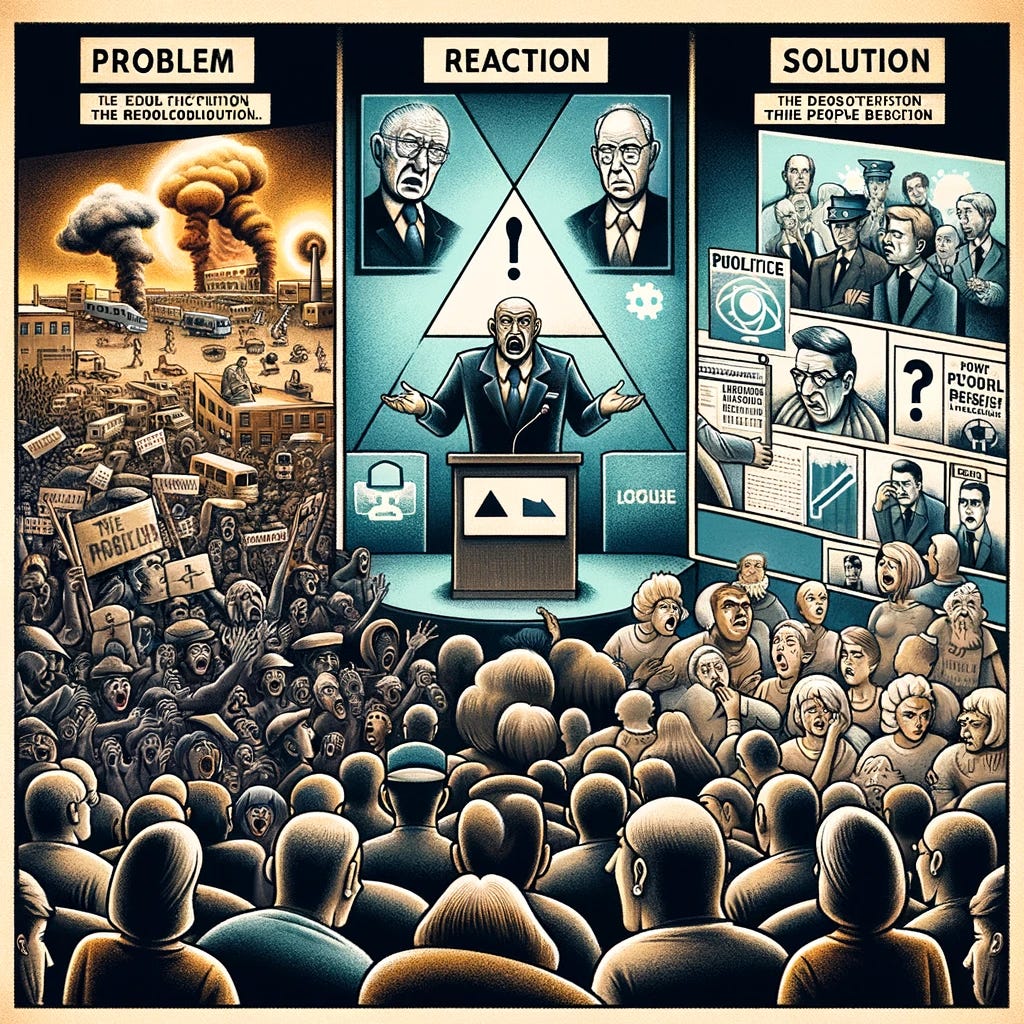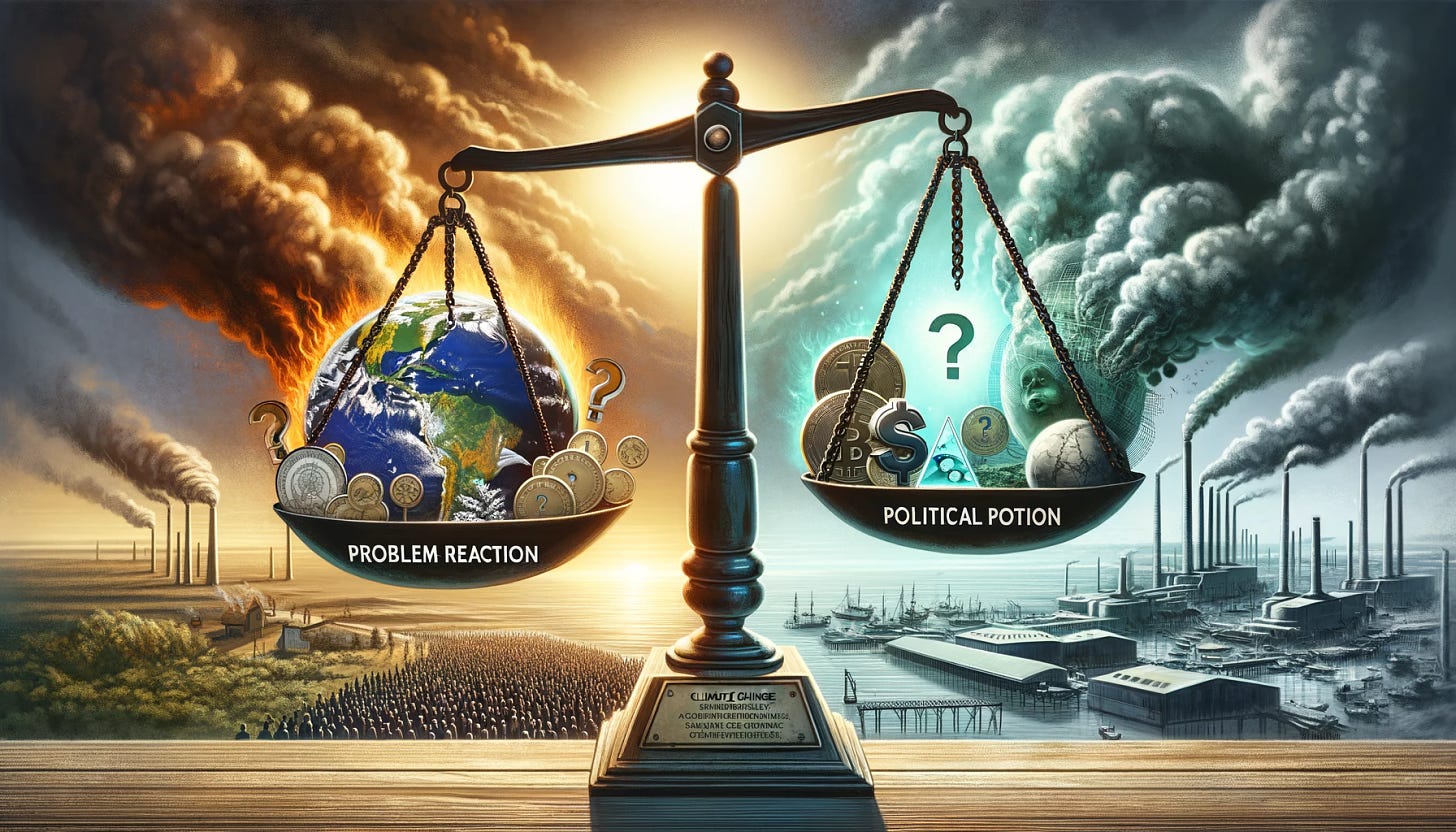The Problem-Reaction-Solution Paradigm: Unraveling Hidden Agendas in Modern Crises
Decoding the Hegelian Dialectic in Contemporary Contexts
The Problem-Reaction-Solution theory, often intertwined with the Hegelian Dialectic, is a framework frequently used to scrutinize major global events and policies. This analytical lens suggests that powerful groups or entities engineer a problem, anticipating a public reaction that allows them to offer a pre-planned solution. While ostensibly solving the issue, these solutions often serve hidden interests, whether they be financial gains, increased power, or expanded control.
Understanding the Dynamics: Problem, Reaction, Solution
1. The Problem: This first step involves the creation or manipulation of a crisis. The crisis could range from economic downturns, health emergencies, to social unrest. Often, these problems are either exaggerated or even orchestrated to create a sense of fear and urgency among the public.
2. The Reaction: The natural human response to a crisis is a demand for resolution. In this stage, the public reacts predictably with a mix of fear, outrage, and a plea for help. Media often plays a crucial role in shaping and amplifying these reactions, furthering the sense of urgency and necessity for action.
3. The Solution: Finally, the entity that created or amplified the problem steps in with a 'solution.' These solutions typically grant more power to authorities, erode civil liberties, or transfer wealth and resources from the public to the elite. The critical aspect here is that these solutions often serve the interests of a select few while being presented as the best or only way to resolve the crisis.
Examining the Beneficiaries: Who Gains?
A skeptical view of the 'solutions' presented in the aftermath of a crisis often reveals who the real beneficiaries are. For instance, in the case of economic crises, bailout packages often favor big corporations, leaving the ordinary citizen bearing the brunt of the aftermath. Similarly, in health crises, certain pharmaceutical companies may stand to gain immensely from the panic through sales of their products, often supported by government mandates.
Historical and Contemporary Examples
Financial Crises: Economic downturns often lead to policies that favor large financial institutions. The 2008 global financial crisis is a prime example, where banks were bailed out while millions lost their homes and jobs.
Health Emergencies: The COVID-19 pandemic saw unprecedented global reactions. Policies ranged from lockdowns to vaccine mandates, benefiting certain pharmaceutical companies and technology firms while raising concerns about privacy and individual freedoms.
War on Terror: Post-9/11 policies significantly expanded surveillance powers and military expenditures, benefiting defense contractors and intelligence agencies while eroding privacy rights.
The Call for Vigilance
In understanding the Problem-Reaction-Solution theory, it becomes vital for citizens to remain vigilant and question the narratives presented to them. Scrutinizing who benefits from these solutions, both financially and in terms of power dynamics, is crucial. The theory prompts us to look beyond the surface and consider the possibility of orchestrated events designed to manipulate public perception and action.
Conclusion: Seeking Transparency and Accountability
While not every crisis is a product of this dialectic, the theory serves as a reminder of the potential for manipulation in the quest for power and control. The need for transparency, critical thinking, and public accountability in the face of crises cannot be overstated. As citizens, staying informed, asking critical questions, and demanding transparency are essential steps in safeguarding democratic values and individual freedoms in the face of orchestrated crises.
The climate change narrative has been dominating global discourse for decades. Initially termed 'global warming', the shift to 'climate change' signals a strategic move, accommodating both natural and man-made alterations in weather patterns. This article employs the Problem-Reaction-Solution theory, also known as the Hegelian Dialectic, to critically examine the climate change issue.
The Problem: Climate Variability or Man-Made Catastrophe? Climate change, as presented, is a colossal problem threatening our planet. Proponents argue that human activities, primarily fossil fuel combustion and deforestation, are significantly warming the Earth, leading to catastrophic consequences. However, a deeper look reveals inconsistencies and exaggerations. Historical data shows Earth's climate has always been in flux, with periods of both warming and cooling.
The Reaction: Fear, Compliance, and Urgency The public reaction to the climate change narrative has been one of fear and urgency, demanding immediate action. This reaction is fueled by media portrayal and scientific assertions predicting dire outcomes, from melting ice caps to catastrophic weather events. Fear is a powerful motivator, and in this case, it's being used to drive public opinion and policy.
The Solution: Who Really Benefits? The proposed solutions to climate change often involve massive economic and social restructuring. From carbon taxes to green energy investments, these solutions invariably require significant public funding and support. However, a skeptical eye reveals that these solutions often benefit a select group of stakeholders – renewable energy companies, certain political groups, and global entities seeking greater control under the guise of environmental stewardship.
The Financial Angle: Following the Money Trail A substantial part of the climate change agenda involves financial transactions, from government grants to carbon credit trading. Who benefits from these financial flows? The answer often lies in a web of interconnected interests among political elites, renewable energy moguls, and global organisations. These entities stand to gain power and profit from the climate change solutions they advocate.
Control and Power: Beyond Environmental Concerns The push for solutions like global governance of climate policies suggests a deeper agenda. It's not just about saving the planet; it's about control. Policies that dictate energy use, land development, and even personal behaviour extend far beyond environmental concern, entering the realm of personal freedom and national sovereignty.
Conclusion: A Call for Rational Skepticism In conclusion, while environmental stewardship is essential, the climate change narrative, as framed within the Problem-Reaction-Solution theory, warrants a healthy dose of skepticism. It's crucial to question who benefits from the proposed solutions and to consider the possibility of natural climate variability. Rational skepticism can lead to more balanced policies that respect both the environment and individual freedoms.






